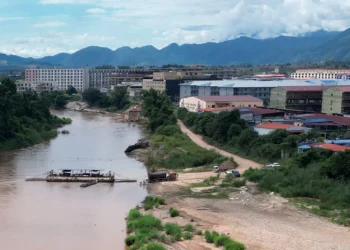By FRONTIER
When Ko Min Naung Khine was brought before a three-member military tribunal inside Insein Prison on September 10 of last year, the insignia on their uniforms told him that his judges were a lieutenant-colonel from the artillery, a major from signals and a captain.
While some public sectors saw hundreds of thousands of staff go on strike following the military coup in February 2021, 29-year-old Min Naung Khine was one of just a handful of judges to join the Civil Disobedience Movement – a decision that got him arrested.
His legal background made the absurdity of his subsequent military trial even more excruciating, he said.
“They sit on their chairs and read the files they have been given. Then they ask for a plea. If a defendant pleads ‘not guilty’, they do not know how to respond,” he told Frontier in October.
He says his appearance before the tribunal lasted 15 minutes and the way it functioned and handed down its verdict was “ridiculous”.
“If someone pleaded ‘not guilty’ they would order the prison guards to take him or her out of the tribunal and pretend to be taking time to consider the verdict. However, they don’t have to consider anything because the verdict has been written for them in the file they have been given,” he said.
In Yangon, military tribunals pass judgement in a room deep inside Insein, a notorious prison where hundreds of political prisoners have been detained since the coup. Figures compiled by the Assistance Association for Political Prisoners show that nationally at least 8,835 people were charged, arrested or sentenced for political reasons last year.
Min Naung Khine, who is believed to be the first judge who went on strike, was the deputy township judge in Bago Region’s Monyo Township before the coup. In June last year, he and his family and some apprentice lawyers living in his home were arrested and brought to the North Okkalapa Township police station in Yangon.
The group included Min Naung Khine’s mother, who is also a lawyer, and his wife, who holds a master’s degree in law. The next day, all were released, except Min Naung Khine, who was transferred to Insein Prison the following month. In September, the military tribunal sentenced him to three years in prison for incitement under section 505-A of the Penal Code. The next month, he was released under a mass amnesty marking the Thadingyut holiday.
After his release from Insein in October, Min Naung Khine, was appointed permanent secretary of the National Unity Government’s Ministry of Justice. The NUG was appointed by lawmakers elected in the 2020 polls, which the military refused to recognise.
“The judicial system has been destroyed and is incapable of delivering justice in cases involving politically motivated charges,” Min Naung Khine said.
Lawyer Daw Thwe Thwe Soe, leader of the Your Legal Advisers team, which provides services to political prisoners, echoed that assessment. At one hearing, she said, she saw a note written on a remand document ordering the judges not to acquit the defendants. “The military council controls judges and decides their verdicts for them,” she said.
Inside the military tribunals and special courts
The regime established military tribunals inside Insein Prison in March last year, after declaring martial law in six Yangon Region townships amid mass demonstrations and military-led massacres of unarmed protesters.
Numerous lawyers told Frontier that defendants cannot expect legal representation in these military tribunals but do have lawyers at special courts, although they still can’t expect a fair trial.
The special courts hear cases from townships not under martial law, and also operate inside the prison. The four military tribunals are based in the old prisoner vocational school inside Insein, while the special courts are in the prison gymnasium, a Buddhist religious centre, and a primary school.
The special courts in Insein hear cases every day, mostly related to political offences, and family members are not allowed to attend hearings. The judge sits in front of a Myanmar flag, with the defendants’ lawyers to his left and the prosecution lawyers to the right. At most special court hearings, defendants have to sit on the floor, lawyers told Frontier.
Min Naung Khine said a man who appeared at the military tribunal before him wrongfully received a 10-year sentence for incitement under section 505-A of the Penal Code; the maximum penalty under that section is three years. Moments after the erroneous sentence was handed down, the tribunal judges made a phone call and then recanted.
“The judges cannot change the verdict after it is issued,” Min Naung Khine said.
Political prisoners without a legal background are similarly derisive of the judicial system under the junta.
“The trial process is meaningless. It’s just a sham. The judges and the lawyers know it’s a sham,” said artist U Min Zaw Oo, better known as Maung Phoe. He and his wife, Daw Hline Zar Chi Phway, were arrested in April last year on 505-A charges and sent to Insein, before being released in October. Maung Phoe was arrested for his protest art, including images showing junta chief Min Aung Hlaing committing suicide.
They were released after the junta accepted an appeal from Maung Phoe’s mother-in-law to show mercy – a process that cost more than K3 million (about US$1,500) in various fees and bribes, according to Maung Phoe.
Lawyers say that under orders issued by the junta for political cases, verdicts are required within 60, 90 or 180 days, depending on the complexity of the case. The charges against Maung Phoe and his wife had a 180-day deadline, but they were released before then.
The arrangement in Insein Prison is far from unique. There are special courts and military tribunals in prisons throughout the country, some of which have been used to sentence prominent members of the National League for Democracy, which controlled the government that was overthrown in last year’s coup.
NLD vice-chair U Zaw Myint Maung was sentenced to four years in prison by a special court inside Obo Prison in Mandalay, which he led as regional chief minister from 2016. The same court sentenced members of his cabinet, including the city’s mayor. NLD patron U Win Htein received a 20-year sentence for sedition from a special court established inside Nay Pyi Taw Prison.
Kayin State Chief Minister Daw Nan Khin Htwe Myint was sentenced to 80 years in prison by a special court inside Hpa-an Prison, which was later commuted to 40 years. Her lawyer, U Zaw Hlaing Win – who also represents four other members of her cabinet – said a township special court and a state high court were established inside the prison.
The township court is in a Buddhist religious hall and the state court in a military interrogation camp. Like other lawyers interviewed by Frontier, Zaw Hlaing Win said these courts don’t follow normal legal procedures.
“The code of criminal procedure stipulates some rights for defendants, but they didn’t get them under this judicial system. We [lawyers] are also not able to freely meet with our clients to take instructions from them,” he said.
To defend or boycott
When regime forces carried out mass arrests of mainly young people at protests in Yangon’s Tarmwe, Hlaing and Sanchaung townships in late February and early March last year, parents and other relatives sought help from lawyers to find out where their loved ones were detained.
“We started compiling lists of detainees with information about when and where they were arrested,” lawyer Thwe Thwe Soe recalled. It was from this process that the Your Legal Advisers group was born. The group now has about 40 members – mostly lawyers, but also some law students and apprentice lawyers, who provide support as paralegals.
While many political prisoners and their families have sought legal help, lawyers who continue to attend trials have faced criticism from some quarters.
“I denounce the judges who have not joined the CDM and I denounce the lawyers who are showing respect to the military regime by attending its unlawful, so-called courts,” said Ko Kaung Myat Thu, 27, a former joint judge in Sagaing Region’s Chaung-U Township.
After the coup, Kaung Myat Thu refused to return to work, and instead helped other civil servants join the CDM. When the junta issued a warrant for his arrest under section 505-A in late February 2021, he went underground, travelling first to Mandalay and then on to territory controlled by the Kachin Independence Army. There, he underwent basic military training for one-and-a-half months.
“Since February and March, I have come to understand that Min Aung Hlaing cannot be defeated only by protests,” said Kaung Myat Thu, who became a judge when he was just 21, an unusually young age in Myanmar.
After leaving Kachin State, he returned to Chaung-U Township to help establish the Chaung-U People’s Defence Force. “The military coup was absolutely unlawful … and we who have devoted ourselves to the law should stand against those unlawful bastards and raise our voices,” said Kaung Myat Thu.
PDFs are a loose network of anti-coup armed groups that rose up in response to the military’s violence against protesters and are generally loyal to the NUG.
Kaung Myat Thu called on all lawyers and judges to boycott the junta’s trials, saying that participating is equivalent to acting as “puppets” of the military.
Figures compiled by Kaung Myat Thu and other CDM judges show that only 24 of the country’s 1,284 judges have joined the strike. Across the entire judiciary, including law officers and court clerks, only 102 of 3,929 civil servants had joined the CDM as of December 20 of last year.
Judge Min Naung Khine also expressed frustration with his colleagues.
“So many doctors have joined the CDM, for example. But who could be more educated than judges? They should have been involved in the frontlines of the CDM,” he said.
Kaung Myat Thu’s hard-line position on the regime-controlled legal system is not shared by all, however. Prominent lawyer U Kyee Myint said that although he has not personally defended any cases since the coup, he believed lawyers representing those arrested for opposing the dictatorship were doing so for altruistic reasons.
“They [lawyers] are taking cases, such as 505-A, because they want to do as much as possible to help them [detainees],” he said.
Thwe Thwe Soe said lawyers would not have had to continue taking these cases if more judges had joined the CDM movement.
“We are not public servants. We are private lawyers who make a living from the cases we take. If we don’t advocate in such cases we have to stay at home. But we want to help people who were arrested for exercising their right to protest against the coup,” she said.
Thwe Thwe Soe said that while lawyers can do little to prevent their clients receiving prison sentences in the junta-controlled system, their presence at trials has other benefits. They can meet with clients and ask about their health, or whether they had been beaten or tortured in interrogation.
“We can see how they are and report back to their families about their condition and also pass on messages,” she said.
Those taking on such cases also face threats and harassment from security forces. Lawyers say the simple fact that the courts are located inside prisons is intimidating.
Thwe Thwe Soe said that while in Insein Prison to work on a case, a police officer once asked her, “Do you want to be able to leave the prison?”
These are not just empty threats. In May 2021, lawyer U Thein Hlaing Tun was arrested while trying to meet with his client, the ousted mayor of Nay Pyi Taw, at a special court. In June, U Thet Htun Oo was arrested while at a court inside Myitkyina Prison in Kachin State, where he had been defending numerous political prisoners.
Thwe Thwe Soe said she has been followed home on multiple occasions. Police and soldiers have threatened to investigate whether she or her team members have had foreign currency transferred to their bank accounts.
Despite these challenges, Thwe Thwe Soe said all she wants for her clients is their freedom.
“I just hope for them to be released soon,” she said, “and for our country to overcome the two disasters of the COVID-19 pandemic and the curse of the military coup.”
Credit – Frontier Myanmar
No justice behind bars: the coup and the judiciary | Frontier Myanmar






